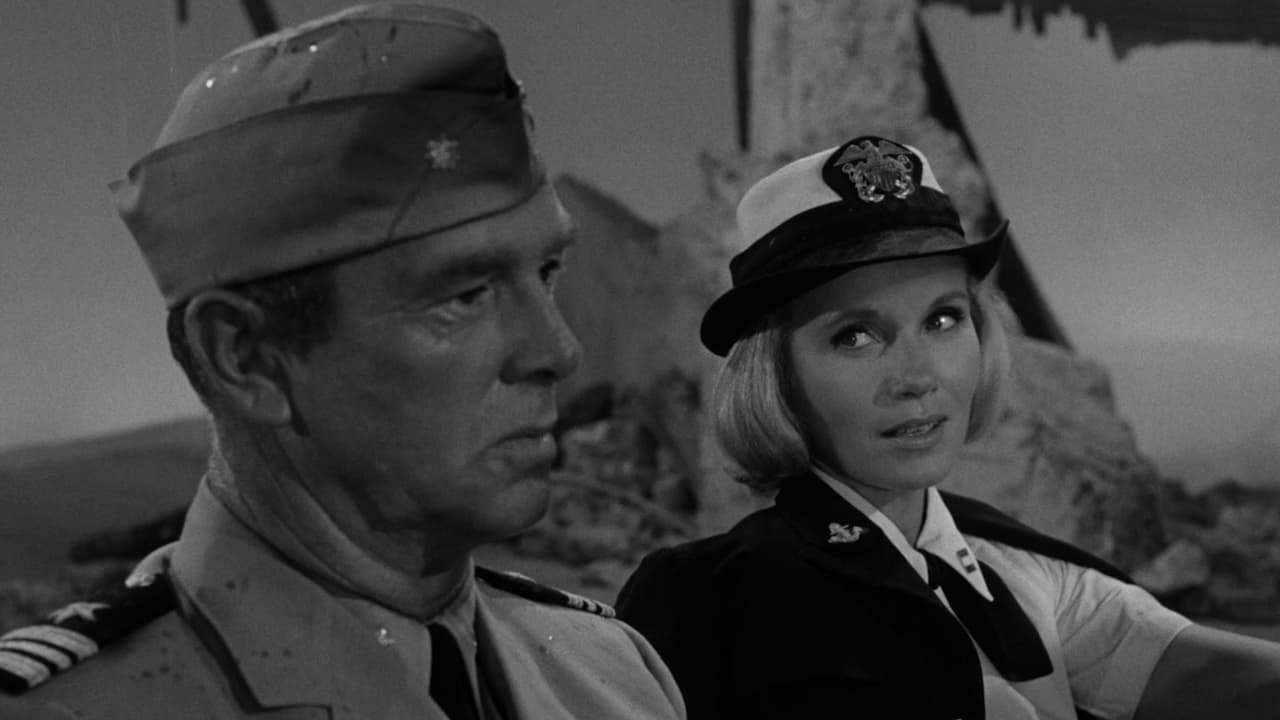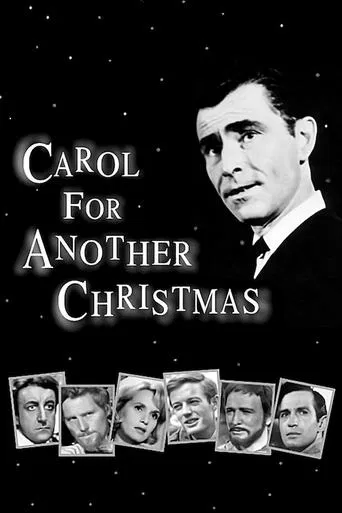


A dated film with a sledge hammer of a message yet it still has a resonant touch here and there. The images of the barbed wire camps bring to mind the camps of current refuges fleeing Syria; and Peter Sellers as the Imperial Me strikes a chord with the current culture of self-esteem enjoying its moment, not to mention the easy comparison to our current President- elect (2016). Granted the acting is heavy handed but with both Sterling Hayden and Sellers in this production , I have to believe that Rod Serling considered that in case people found the message of Dr. Strangelove or: How I learned to Stop Worrying and Love the Bomb too subtle (as if), he was going all out here to make it clear. Might be time for an update, but I believe the current "Conservative" political climate is too charged to be able to pull it off.
... View MoreRod Serling Sterling Hayden, Ben Gazzara the UN has been super-effective Daniel Grudge--isolationist Marley, lost son pro-US interventions--but we should be a lot more selective most of these deaths WERE in vain keep talking--so long as you talk you don't fight.... was WWI intervention a good thing?"A Carol for Another Christmas" was apparently shown with no commercials on TV and was sponsored by the United Nations--so it was seen as a very important event. However, when you see it today, it comes off as silly, heavy-handed and incredibly naive. Rod Serling used Dickens' "A Christmas Carol" as a starting point for this film. Instead of Ebenezer Scrooge and stinginess, the plot is about Daniel Grudge (Sterling Hayden) and his hatred of US intervention in foreign problems. However, like in the Dickens story, various ghosts appear to show Grudge the error of his ways and in the end, Grudge is a huge proponent of the UN and US intervention abroad.In 1964, this apparently sat well with audiences. Today, however, it brings up a multitude of issues apart from the bad writing. The idea of the US acting like an international police force has become a hated concept with many nations and isn't very popular here, either. And, the UN has consistently proved that the organization is inept and unwilling to deal with evil. Now if you ignore the politics of the film, you are still left with a production that is about as subtle as a nudist at a Baptist picnic. Heavy-handed and silly--this is one that Serling biographers probably won't mention as it's a rare failure for this brilliant writer. Stupid and awful.
... View MoreI'm a big fan of The Twilight Zone. I have enjoyed Rod Serling's writing, whether it was Zone or Night Gallery or his film work. But he had his failings as a writer, too. Specifically when he felt passionately about a cause, he could write some dialogue that was pretty heavy-handed and prone to speechifying. Usually this was limited in the restraints of a half-hour television show. But in this film-length special he is not only afforded the opportunity to get on his soapbox quite a bit more, but encouraged to do so. And so he does, almost nonstop, and the film suffers for it.The plot is a reworking of Dickens' A Christmas Carol for the 1960s. Sterling Hayden plays our Scrooge-like character, Daniel Grudge, a wealthy man who lost his son, Marley, in World War II. So now he's a bitter, jaded isolationist who scoffs at ideas of world peace or brotherhood of man. Like Scrooge, he will be visited by three spirits. But not before we get a long opening argument between Hayden and Ben Gazzara. This whole protracted piece was more of a political debate than actual conversation two people would have. It would also begin an interesting recurring theme throughout this story. That is that Serling, as the writer, had no answers for any of these problems beyond platitudes. Sometimes Gazzara would make a point and Hayden would have no real rebuttal. Sometimes Hayden would make a point and Gazzara would have nothing. While one could make an argument this is representative of real-life political discourse, I would argue it's also representative of the same outcome of that: apathy. We the viewers, like we the voters, grow apathetic towards repeated arguments that lead nowhere with no real solutions offered beyond the abstract. Later in the story Hayden's character just stops arguing his point and converts his beliefs with no legitimate reason given why he would do this, other than they needed to get him to the inevitable Scrooge-sees-the-light ending. Because he was dealing with real world issues that he has no solid solutions to, Serling has Hayden change suddenly and you're left with the feeling that it happened "just because." Speaking of Sterling Hayden, he is a wooden actor and is especially stiff here. Truthfully his performance in this special at times is just plain awful, with that vacant expression on his face that leaves us to figure out if he's deep in thought or on the verge of a poo.The Ghost of Christmas Past is played by Steve Lawrence, who plays the role with a casual ease that's enjoyable to watch....at first. But after a short while he starts to grate on the nerves and comes across as a cocksure jerk. More patronizing soapboxing. A favorite reply of Serling's in this special is to have someone respond to something Hayden says to them with something akin to "Oh is that so." It happens frequently and is very annoying.The Ghost of Christmas Present is played by Pat Hingle and he does fine in a rather forgettable segment about starving children. This is the weakest piece of sophistry in the film. There's a rule online that basically goes "the first person to bring Hitler into any argument automatically loses." Well, there should also be a rule that the first person to bring starving children into any argument also loses. The Ghost of Christmas Future is played by Robert Shaw and this segment is the best. Shaw breathes life into the wordy script. Then comes Peter Sellers as the Imperial Me and it's a whole different film. The entire sequence outclasses everything that has happened in the previous hour. Why? Because this is what film is: stories told through a combination of words and especially images. The rest of the special was just a series of monologues and political stump speeches. That's not good filmmaking or good storytelling. Sellers and Shaw are excellent in this part. They really take Hayden to acting school and embarrass him. Had the entire special been like this, regardless of the message, I would have loved it. After the Future segment, we're back to the present and Hayden's inevitable change of heart. Of course, because Hayden is a robotic actor lacking in emotion, we are left to guess if he is sincere in this change. Ben Gazzara shows back up to be a sore winner and heap more lecturing on Hayden, despite the philosophical change Hayden's undergone. Amusingly, Gazzara seems neither surprised nor impressed with it. Terrible writing that even the worst retelling of Carol has gotten right. If you don't feel Scrooge has really changed in the end, what was the point of the story? Then, there is the patronizing ending that will make your eyes roll. I won't spoil it for you if you want to be surprised. The best I'll say about it is that I'm sure Serling's heart was in the right place.Overall, it's a curious experiment that is mostly unsuccessful. However, the star power involved and the phenomenal future segment with Shaw and Sellers warrant you should check it out. Serling fans, especially those who embrace even the clunkiest of his works, will enjoy it most.
... View MoreA Carol for Another Christmas (1964) * (out of 4) Rod Sterling wrote this updated version of Dickens' A Christmas Carol, which centers on a grieving father (Sterling Hayden) who recently lost his son in a war and takes his anger out on everyone around him. The man eventually gets visited by three ghosts (Steve Lawrence, Pat Hingle, Robert Shaw) and learns a lesson. A CAROL FOR ANOTHER Christmas was directed by Joseph L. Mankiewicz and if you look around at reviews you'll see that there are many positive ones but I'm not going to be among them. In fact, I'd go as far to say that this here is without question the worst "version" of the Dickens' tale that I've ever seen and it's rather shocking that with a writer and director like this film has that the film could turn out so bad. The idea of updating the story isn't what kills the film. The film is a very anti-war picture that speaks of the evils of war and it pretty much beats the viewer over the head with its message. I don't mind any film being political and I don't mind a message being passed but what I can't stand is when that political message is poorly written and is nothing more than a writer ranting for people to hear his story. I personally grew tired of the dialogue within the first ten-minutes and I really started to hate the characters. Nothing here felt real because it just seemed like one big political rant. Yes, war is evil. Yes, people die in war. The message could have gotten across a lot better without all the preaching and bad dialogue. Not to mention countless bad situations where things happen for no reason other for another speech. The film offers up some fine performances by all and we also get Ben Gazzara, Eva Marie Saint, Britt Ekland and Peter Sellers in brief roles. Fans of the all-star cast are going to be tempted to watch this thing and it's a real shame their talents are so wasted.
... View More